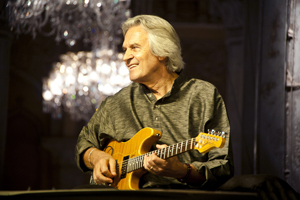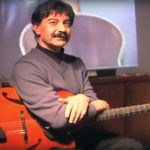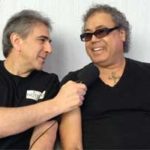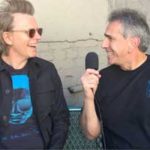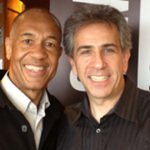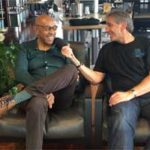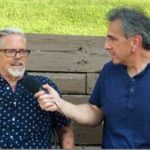John McLaughlin on his now Grammy Award-winning lifetime in music
By Gary Graff
February 7, 2017
John McLaughlin may be going out, but he’s going out in a big way. The English-born guitar legend called it quits from touring last year, ending that phase of a lengthy career during which he played with Alexis Korner, Georgie Fame & the Blue Flames, the Graham Bond Organisation and Brian Auger at home before coming across the pond to work with Tony Williams’ Lifetime and Miles Davis and then forming his own Mahavishnu Orchestra. Over the course of those 65 years, McLaughlin became a true fusionist, piling blues, flamenco, jazz, rock and classical into his own flexible but readily identifiable sound, whether in his own projects or collaborating with the likes of Carlos Santana, Al Di Meola, Paco de Lucia, Chick Corea, Shakti and more. It’s both ironic and appropriate, then, that this year he won his first Grammy Award as a solo artist for a live rendition of “Miles Beyond” from Live @ Ronnie Scott’s, a concert album with his band the 4th Dimension. It allows McLaughlin to put his suitcases away with a sense of satisfaction, but he promises that his guitar will remain out of the case and active for many years to come…
FGPO: We can’t get you to reconsider this retirement from touring, can we?
McLaughlin: [laughs] It’s about growing old. At my age, a nice young 75, normally I’d be retired 10 years ago. But, you know, musicians never die, they just decompose, so I’m on my way…
FGPO: What’s the story here, though?
McLaughlin: God bless my mother. I inherited music from her, but also I inherited arthritis. It’s creeping up on me. Musically at the moment things are great, but I’d be nervous about next year, and after that. I think one of the most catastrophic things that could happen would be to go on tour and have a really bad hair day where I’m not really able to play. This is a nightmare for me. I don’t want to get confronted with that situation. I told the guys in the band some months ago that this is the goodbye tour. We’ll see how it goes. I expect to do isolated concerts, but not the tours.
FGPO: You’re known around the world and arguably more famous elsewhere. Why North America for the farewell tour?
McLaughlin: Actually it’s very appropriate that I do it in North America because it’s almost full circle in the sense that I arrived at the end of the ‘60s in New York to play with Tony Williams Lifetime, and I ended up playing with Miles Davis 48 hours after I arrived and continued playing with him until the last concert in Paris in ’91. In fact it was Miles pushing me to form my own band already in October, I think, of 1979. He told me straight it was time to form my own band, and that was Mahavishnu Orchestra. And Mahavishnu in America, the way it was embraced there I don’t really have words to express my feeling about that. So my affection for America, American people, the American public that just took me and my music to heart, that’s where I wanted to say goodbye.
FGPO: How did guitar became the instrument for you?
McLaughlin: Oh man, that was all my brother’s fault. I’d been studying piano from eight years old, the usual — Beethoven, Mozart, the simple classics. But I was about 10 and my eldest brother — I’m the youngest of five kids, so my oldest brother was 10 years older than me — was already at university. He came home once on break and he had a guitar. I’m looking at this instrument, thinking: “That’s kind of interesting, very interesting,” and he’s playing it, just fooling around with it. After a few months, he got bored and the No. 2 brother took it and started fooling around with it, and a few months later he got bored, the third brother didn’t get it, my sister wasn’t interested, so it came to me and it was a revelation. That guitar arrived in my hands and one of my brothers showed me the D chord and that was it. I knew. To feel that sound in my body with the guitar was…I can’t describe it. I took that guitar to bed with me every night. I quit the piano immediately and played guitar from then on.
FGPO: So a 65-year love affair?
McLaughlin: That’s right. I loved that instrument. I love guitar. It’s like why do people play the trombone? It’s got to be a love affair. Why do people play contrabass, or drums, or piccolo? Who wants to play piccolo? Well, the guy who plays piccolo, he loves it. It’s weird how instruments and people of different personalities get together.
FGPO: What influences and sources did you have growing up?
McLaughlin: Again, thanks to two of my brothers in university — going back to 1953 here — in the U.K. the blues boom arrived and came through the U.K. like a tsunami. University children got hip to it right away and my brothers brought home those blues records, so I was discovering Mississippi blues players and singers. The first thing I heard was Muddy Waters playing slide guitar with Little Walter on harmonica — unbelievable! I’d grown up with classical music my whole life, ’cause my mother was an amateur violinist. Then I’m 11-years-old listening to “Forty Days and Forty Nights,” and it was a revelation. Big Bill Broonzy, Mississippi Fred McDowell, Robert Johnson, the whole gang.
FGPO: And yet you wound up veering towards jazz whereas most the U.K. kids who discovered blues played rock.
McLaughlin: What happened was within two years my oldest brother introduced me to flamenco guitar players. My brothers really encouraged my relationship with the guitar. They were looking for guitar records to bring home. They introduced me to flamenco music, which is why I ended up playing with Paco [De Lucia]. By 15 years old, I was skipping school at the end of every month on Thursday. I was living up in the northeast of England, just south of Scotland, so I hitchhiked to Manchester where my brother was at university and we’d go to a club where real flamenco guitarists were playing. My school work was useless. I didn’t care. Flamenco guitar stayed with me.
FGPO: And that became a portal into jazz?
McLaughlin: Yes. I heard Miles — Miles Ahead, Sketches of Spain. That’s when I got into jazz. That was fusion jazz. Miles integrated this whole Hispanic mood, and of course he was also playing the blues. One track on Miles Ahead called “Blues For Pablo” changed my life. I was already taken with Miles, and by this time I’d become quite aware of jazz through Django Reinhardt, who blew my mind. So it was inevitable that I’d hear American jazz. And when I heard Miles — I was 15 the first time — it just took me out. And then he issued this album Milestones with [John] Coltrane, Cannonball Adderley, Red Garland — that’s when I heard ‘Trane for the first time. Then in ’59 Kind of Blue came out, and if there’s one jazz album that is the distillation of perfect jazz, it’s that. That album changed my life.
FGPO: Were there guitar players in that scene who had a big impact on you, too?
McLaughlin: I heard some of the guitar players like Wes Montgomery, but I was taken by the horns. Miles schooled me, Coltrane too, and Cannonball Adderley. That was the school for me. That was the yardstick. And I was asking myself: “Why don’t they have a guitar player?” I wanted to hear a guitar player play that stuff they’re playing. Miles eventually did, with George Benson before I came over. It was through Miles I heard Tony Williams in ’65 and got the miraculous chance to play with him.
FGPO: It was a pretty charmed life, then, to come over to America and play with these guys you admired so much.
McLaughlin: Oh, a dream come true. I could have kissed the ground in America. For any European jazz musician, America is the dream. I arrived and Tony met me at the airport, and he was finishing a week at the Club Baron with Miles up in Harlem. That night I’m in Harlem, and it was like paradise. And, of course, I met Miles that same day, and when I met him again was when he asked me to do In a Silent Way. How lucky can you be?
FGPO: Talk a little about your rock ‘n’ roll peers and your relationships with them.
McLaughlin: Well Jimi [Hendrix], my God, I knew Jimi since we were both 17, 18. We both became studio sharks playing on things — sometimes good, sometimes not so good, and mainly pop but we survived. Eric [Clapton] I knew from ’62, ’63, when he was playing with John Mayall’s Bluesbreakers. What he was doing there was really beautiful, and I really think it had a very powerful impact on Jimi when Jimi arrived in the U.K. And I was playing with Jack Bruce and Ginger Baker in Graham Bond when they went off and formed Cream with Eric, and what an amazing impact they had, and what Eric was doing with a guitar there was really amazing. That really interested me much more than the jazz kind of cool tone. It took me a year to figure out what [Clapton] was doing there, and you had ‘Trane in his world playing three notes on one note, and then Jimi came on and blew my mind and a lot of other minds, too. There was a real analogy with what Jimi was doing with guitar and what Coltrane was doing with saxophone. They were definitely looking for the same thing.
FGPO: You can really hear that impact on you, too, in the context of Lifetime, Miles and then Mahavishnu.
McLaughlin: Lifetime, that was something else. What a band that was. I really should point out I had two relationships going at the time, very different. I was there to play with Tony and was in Lifetime, but after In A Silent Way, I must have passed some kind of test ’cause Miles was inviting me three, four times a week over to his house, and it was always: “Bring the guitar, John.” We’d be out the house and he’d have a keyboard out, a piano, and he’d play a chord and say: “What do you hear about that? Do you a riff on that?” He was hearing a change and he wanted to move on. Tony wanted new music, too. Tony wanted me to write music for Lifetime, Miles was picking my brain for riffs and stuff like that. Finally it Miles who said: “John, you’ve got to do your own thing, man. Get on with it…”
FGPO: You’ve retired from touring but not recording, right?
McLaughlin: That’s right — I mean, they say I stop I’ll keel over. I play every day, not because I want to, not because I need to but because I love to. Every time I play I’m happy, even though some days I’m playing like a dog. So I’m going to continue. I have projects coming up. You won’t see me as much but you’ll still hear me, I promise.
